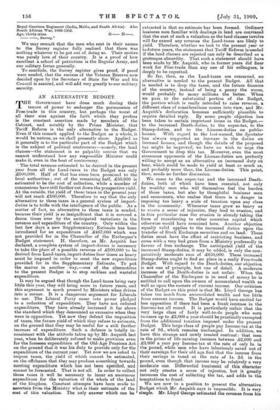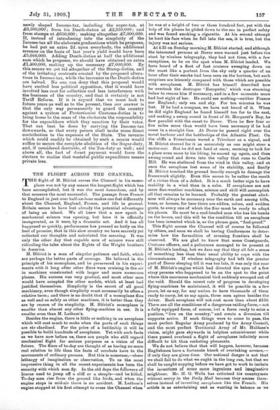AN ALTERNATIVE BUDGET. T HE Government have' done much during their
tenure of power to endanger the permanence of Free-trade in this country, but perhaps the worst of all their sins against the faith which they profess is the constant assertion made by members of the Cabinet, and notably by the Prime Minister, that Tariff Reform is the only alternative to the Budget. Even if this remark applied to the Budget as a whole, it would be untrue, as we shall presently shows Applied as it generally is to the particular part of the Budget which is the subject of political controversy—namely, the land clauses—the statement is so palpably untrue that we cannot understand how any responsible Minister could make it, even in the heat of controversy.
' The total revenue estimated to be derived in the present year from all the Land-taxes in the Budget was only £500,000. Half of that has since been promised to the local authorities ; out of the remaining half, £50,000 is estimated to be the cost of collection, while a number of concessions have still further cut down the prospective yield. At the outside, the yield of these taxes in the present year will not reach £100,000. Therefore to say that the only alternative to these taxes is a general system of import- duties is to trifle with the intelligence of the public. As a matter of fact, no alternative to these taxes is needed, because their yield is so insignificant that it is covered a dozen times over by the anticipated variations in the revenue and expenditure of the country. Only within the last few days a new Supplementary Estimate has been introduced for an expenditure of £467,000 which was not provided for in the Chancellor of the Exchequer's Budget statement. If, therefore, as Mr. Asquith has declared, a complete system of import-duties is necessary to take the place of a possible revenue of £100,000 to be derived from Land-taxes, import-duties four times as heavy must be imposed in order to meet the new expenditure provided for in the Supplementary Estimate. To put the matter in another way,—one of the alternatives to the present Budget is to stop reckless and wasteful expenditure. It may be argued that though the Land-taxes bring very little this year, they will bring more in future years, and this argument is much pressed by Ministers when driven into a corner. It is a dangerous argument for Liberals to .use. The Liberal Party came into power pledged to a reduction of expenditure. They have not reduced expenditure. They have already increased it far above the standard which they denounced as excessive when they were in opposition. Yet now they defend the imposition of taxes, the future yield of which they refuse to estimate, on the ground that they may be useful for a still further increase of expenditure. Such a defence is totally in- consistent with the attitude taken up by Mr. Asquith last year, when he deliberately refused to make provision even for the foreseen expenditure of the Old-Age Pensions Act on the ground that it was his duty to provide only for the expenditure of the current year. Yet now we are asked to impose taxes, the yield of which cannot be estimated, on the offchance that they may produce something towards meeting expenditure which has not been specified, and cannot be forecasted. That is not all. In order to collect these taxes it will be necessary to incur an enormous expenditure for the valuation of the whole of the land of the kingdom. Constant attempts have been made to ascertain from the Ministry what is their estimate of the cost of this valuation. The only answer which can be extracted is that no estimate has been formed. Ordinary business men familiar with dealings in land are convinced that the cost of such a valuation as the land clauses involve will far exceed any revenue the Land-taxes are likely to yield. Therefore, whether we look to the present year or to futdre years, the statement that Tariff Reform is needed if the land clauses are rejected can only be described as a grotesque absurdity. That such a statement should have been made by Mr. Asquith, who in former years did finer work for Free-trade than any one of his colleagues, is deeply to be regretted. So far, then, as the Laud-taxes are concerned, no alternative is needed to the present Budget. All 'that is needed is to drop the taxes, and the future finances of the country, instead of being a penny the worse, would probably be many millions the better. When we pass to the substantial portion of the Budget, the portion which is really intended to raise revenue, a different class of considerations comes into view, and Mr. Asquith's declaration becomes sufficiently plausible to require detailed reply. By some people objection has been taken to certain important items in the Budget,— to the increased Death-duties, to the super-tax, to the Stamp-duties, and to the License-duties on • public- houses. With regard to the last-named, the Spectator has always supported an increase in the duties on licensed houses, and though the details of the proposed tax might be improved, we have uo wish to urge the Government to drop this tax. Moreover, even the most strenuous opponents of the License-duties are perfectly willing to accept as an alternative an increased duty on beer, which could be made to yield at least as much as, and probably more than, the License-duties. This point, then, needs no further discussion.
We come to the super-tax and the increased Death- duties, both of which have been resented, not only by wealthy men who will themselves feel the burden of these taxes, but also by thoughtful business men and economists, who realise that there is a danger in imposing too heavy a scale of taxation upon any class in the community. Whenever taxes grow so heavy as to create a sense of injustice, they lead to evasion, and in this particular case the evasion is already taking the form of transferring to other countries capital which otherwise would have remained here. Another objection equally valid applies to the increased duties upon the transfer of Stock Exchange securities and on land. These duties must have the effect of restricting business, and come with a very bad grace from a Ministry professedly in favour of free exchange. The anticipated yield of the increased Stamp-duties, it may be added, is only the com- paratively moderate sum of £650,000. These increased Stamp-duties ought to find no place in a really Free-trade Budget. With regard to the Death-duties, our objection is not one of principle, but one of detail. A moderate increase of the Death-duties is not unfair. When the Chancellor of the Exchequer is in need of money lie is entitled to call upon the owners of accumulated wealth as well as upon the earners of current income. Our criticism of the Budget ou this point is that Mr. Lloyd George has taken too much from accumulated wealth and too little from current income. The Budget would have excited far less opposition if there had been a frank increase in the Income-tax all round. It is particularly unfair that the very large class of fairly well-to-do people who earn incomes up to £2,000 a year should be practically exempted from the additional taxation imposed under the present Budget. This large class of people pay Income-tax at the rate of 9d., which remains unchanged. Iu addition, we have this strange and newly created contrast: that men in the prime of life earning incomes between £2,000 and £3,000 a year pay Income-tax at the rate of only ls. in the pound, while men who have laboriously saved out of their earningS for their old age find that the income from their savings is toted. at . the rate of is. 2d. in the pound, even though that income may be relatively a very moderate one. Differential treatment of this character not only creates a sense of injustice, but it greatly increases the cost of collecting the tax, and adds to the temptations to fraud.
We are now in a position to present the alternative Budget which Mr. Asquith says is impossible. It is very simple. Mr. Lloyd George estimated the revenue from his
newly shaped Income-tax, including the super-tax, at £3,500,000; from his Death-duties at £2,850,000; and from stamps at £650,000 ; making altogether £7,000,000. If, instead of introducing into the simplicity of the Income-tax all the elaborate graduations which he proposes, Le had put an extra 2d. upon everybody, the additional revenue on the basis of last vear's yield would have been .25,666,000. Adding Death-duties at half the additional sum which he proposes, we should have obtained an extra £1,400,000, making up the necessary £7,000,000. By this means we get rid altogether of the Stamp-duties, and of the irritating contrasts created by the proposed altera- tions in Income-tax, while the increases in the Death-duties are halved. No one can deny that this proposal would have excited less political opposition, that it would have involved less cost for collection and less interference with the business of the country, and that it certainly is not Tariff Reform. If it is argued that we must look to future years as well as to the present, then our answer is that the only way permanently to guard the country against a system of Protectionist Customs-duties is to bring home to the mass of the electorate the responsibility for the expenditure which they sanction by their votes. That can best be done by carrying the Income-tax downwards, so that every person shall make some direct contribution to the expenses of the State. The revenue which could readily be obtained by such a means would suffice to secure the complete abolition of the Sugar-duty, and, if considered desirable, of the Tea-duty as well ; and above all, the fact of direct payment would force the electors to realise that wasteful public expenditure means private loss.







































 Previous page
Previous page